April 22, 2021
Providing Aid in Moments of Need: A Q&A with Warren Acuncius (MPA ’07)
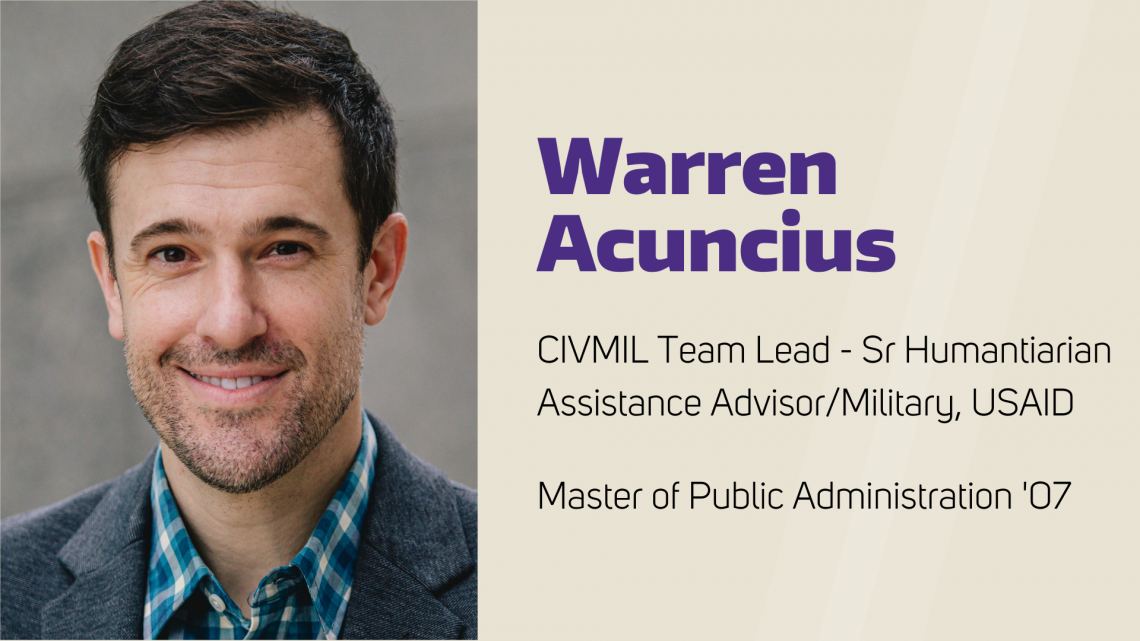
Can you share a bit about the work you are currently doing and what a typical day in your job looks like?
I work for the United States Agency for International Development’s Bureau for Humanitarian Assistance (USAID/BHA). Recently, this was called the Office of US Foreign Disaster Assistance or “OFDA”, and has been the lead humanitarian arm of the US Government (USG) for over 55 years. BHA provides life-saving humanitarian assistance—including food, water, shelter, emergency healthcare, sanitation and hygiene, and critical nutrition services—to the world’s most vulnerable and hardest-to-reach people. My specific position as a Humanitarian Assistance Advisor works at a policy level in Washington, D.C., an operational level at US Military Commands, and tactically as part of disaster assistance response teams (DART) in the field during USG foreign disaster relief efforts. My work is done before, during, and after a humanitarian crisis to appropriately integrate USG interagency (e.g., US Military) as support to USG civilian led response in rapid onset (e.g., earthquake), slow onset (e.g., drought), and complex emergencies (e.g., civil war).
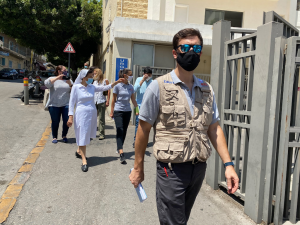
There is no real “typical” day in my job, but it is heavily “field-centric”, whether in the office or in the field. I recently moved back to Washington D.C. from Oahu, HI where I advised the highest levels of the US military and spent about 40% of the time traveling in the South Asia, East Asia, and Pacific regions. My new team lead position in Washington D.C. focuses on international disasters in South Asia, the Pacific, Latin America, the Caribbean, and North America. While much of my day-to-day work is focused on enabling our field offices around the globe to integrate disaster risk reduction efforts, BHA also responds to approximately 60-70 international crises a year, globally. This is done through funding to NGOs and international organizations, by providing commodities to alleviate disaster related suffering, and by deploying to coordinate USG crisis response efforts on the ground. Most recently I was in Lebanon after the 2020 explosions and have also deployed and/or supported efforts in Liberia, Nepal, Micronesia, Yemen, Syria, Iraq, South Sudan, Ethiopia, and more.
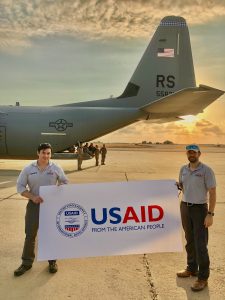
Much of my career has been spent focusing on the civilian-military nexus, where US military supports civilian led USG humanitarian efforts. I spend much of my time teaching classes to US and international military personnel, playing in military exercises, and supporting humanitarian crises. When I am on the ground my job requires strong communication skills, an ability to coordinate with various professional cultures, and I work to build advocacy amongst the whole international humanitarian community. While I work for the USG, I advocate for (and try to protect) the core humanitarian principles that guide organizations like the United Nations, Red Cross Movement, and non-governmental organizations working in the humanitarian field.
While on deployment my time may be spent assessing the impacts of a disaster to determine appropriate use of US tax payer funded aid. I might be on the tarmac loading a helicopter with commodities headed to those in need. I could be identifying and moving NGOs who must get to remote locations to work. Everything is based on the assessed need in the moments we are there.
So, today may be catching up on email, but tomorrow I may be deployed to remote locations around the globe to help those most in need. It is exciting and rewarding and I can not imagine a better career.
What contributed to your decision to pursue a career in support of the public good? Was there a defining moment in particular?
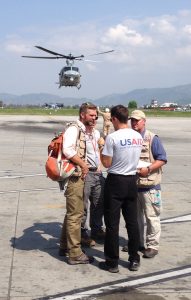
There is nothing more professionally (or personally) rewarding than seeing your “blood and sweat equity” going to help people truly in need. As broad categories, my work and personal travel have encouraged me to pursue a career dedicated to the public good. How that ended up taking shape through international disaster relief is more a series of random experiences than one defining moment.
Along the continuum of events that have played a role, I strongly associate the following life changing events: Independent travel, working in challenged international communities, working in disaster settings, refining my academic rigor (Evans School and Hopkins), supporting various Federal missions that ultimately had little to no impact, and being in the right place at the right time. Each of these is a story in and of itself that I would happily share over a beer or whiskey.
If there was one thing you’d want everyone to know about your work, what would it be?
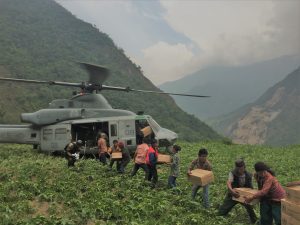
There are MANY things I wish everyone knew about the field of humanitarian assistance, but if I had to pick one thing initially, I would ask people to realize the dedication and importance of those that choose humanitarian assistance as a career. I’m not speaking about my “cushy” government job, but the real humanitarians who work in the field for months and years at a time and accept physically and emotionally taxing work in unstable and often dangerous environments, often with nothing more than their ability to communicate and advocate for humanitarian principles. This work can be rewarding, but it can also be endlessly disappointing, as we see protracted crises increasing, not decreasing, globally.
I want people to know about the dedication of the people who operate humanitarian organizations (like Doctors Without Borders and the THOUSANDS like it) that are made up of international and local staff dedicating their lives to helping others survive crises. If this kind of mission clicks with you, there are many opportunities out there that require dedicated and smart individuals to help them further their principled cause. I am happy to speak with anyone about places to start looking if this work sounds right for you—connect with me on LinkedIn.
Who has been your strongest influence in life? Why?
It is tough to pick one influencer in my life, but this simple fact has been a benefit to my learning and professional development. My mentors have arrived at various points in my career and life, so long as I kept my eyes open for them along the way. Some I met during my time at Evans, and others I met in the opportunities I took after graduation. Some influenced me by challenging my perspective and some pushed me by showing me things from a completely different angle. I am inclined to say that those who did not share my core beliefs pushed me further into my current field than those that did. Along the way I have selected and been chosen by amazing mentors. Never hesitate to pick up a few with each experience you have or place you work. Just remember to pay it forward. When someone helps you along the way, you must turn around and help those who were once in your shoes. I will also say that finding mentors is a life-long journey that should never stop.
Looking back on your Evans School experience, what stands out as the most impactful aspect and why?
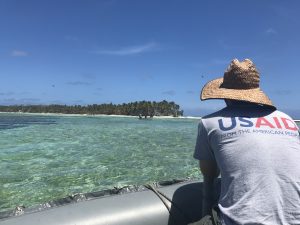 While the Evans school’s dedicated faculty are wonderful for imparting knowledge, it is the environment they create that has most informed my perspective. Classes where student discussion was core to understanding various perspectives built on experience and academics. Patient and wonderfully insightful people like Leigh Anderson and Margo Gordon invested seemingly endless amounts of time and were willing to field never ending questions and provide encouragement along the way. To this day, I still pester Leigh whenever I get the chance, and she graciously accepts me in when I knock on her door. She was a huge help in getting my (once Evans School and now) Jackson School Humanitarian Aid & Disaster Relief course off the ground!
While the Evans school’s dedicated faculty are wonderful for imparting knowledge, it is the environment they create that has most informed my perspective. Classes where student discussion was core to understanding various perspectives built on experience and academics. Patient and wonderfully insightful people like Leigh Anderson and Margo Gordon invested seemingly endless amounts of time and were willing to field never ending questions and provide encouragement along the way. To this day, I still pester Leigh whenever I get the chance, and she graciously accepts me in when I knock on her door. She was a huge help in getting my (once Evans School and now) Jackson School Humanitarian Aid & Disaster Relief course off the ground!
What is your favorite podcast these days? What is a great book you have read recently? Or the “GOAT” (greatest of all time) book you’ve read?
I haven’t found the time to add podcasts to my “to do” list and instead opt for books on “tape” and on kindle (a must for anyone who travels extensively). Aside from the more academic books on humanitarian assistance (e.g., Empire of Humanity, Humanitarian Ethics, Emergency Sex and Other Desperate Measures), I recently finished Dark Matter, Spillover, Educated, and How Everything Became War and the Military Became Everything. Right now, I am reading a kind of humanitarian “choose-your-own-adventure” titled, “Decision Making in Disaster Response.”
My favorite books of all time are the Count of Monte Cristo, Hot Zone, and The Agony and the Ecstasy. Ok, I love Jurassic Park, too.
How does your Evans education impact how you approach your work today?
My Evans education reminds me of how far I have come since the days before picking my career. It was in the Evans School lounge that a classmate said to me, “Ya know what would be cool? A career in disaster response.” My brain almost exploded. This new idea would eventually focus my efforts at Evans to get into the field I am in now. The school provided me a platform to ask questions, challenge perspectives, and learn from everyone in my immediate vicinity. Sometimes I was provided answers, and others times I was simply encouraged to dig more into the field with the guidance of my advisor. Education at Evans is not simply about the academic rigor, but may be MORE about the opportunity to network, ask questions, challenge beliefs, and develop your own perspective. I thought my graduate degree would be about what professors told me. Instead it was about the space they created for me to learn from them, my peers, and myself.
It is my gratitude for what I have gained through Evans and the UW that brings me back to teach (hopefully) the next generation of humanitarians. My experience has made me a Husky for life. Go Huskies!
We’d love to learn more about you and your tremendous contributions to the public good, so we can share your story as we connect, learn, and reflect. Share your story!